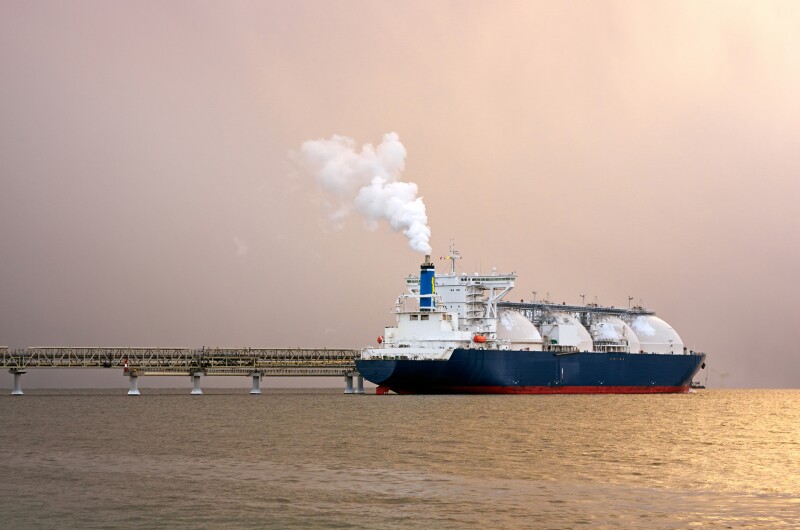When sanctions against Russia were announced on Thursday, the oil industry was notably absent from the fact sheets.
There is a one-word explanation for this: gas. And it refers to the fuel in its two commonly used forms: gasoline and natural gas.
In the US, the focus was on holding down gasoline prices and US President Joe Biden said the US is working with other countries on a coordinated release of oil from the Strategic Petroleum Reserves to increase supplies.
In his added-on sanctions, Biden told consumers that he had seen sharp price increases this year and that “I will do anything I can to reduce America’s pain at the gas pump.”
And during a week when the price for crude oil is up 25%, he warned oil companies about raising the price of refined products. “American oil and gas companies should not exploit this moment to hike their prices and raise profits,” he said.
In Europe, natural gas has been the pain point. And that grew more acute after the invasion which triggered as much as a 50% increase in the already extremely high price.
A significant problem is the potential banning of SWIFT (the Society for Worldwide Interbank Financial Telecommunication), a system which plays a major role in international commerce. In Russia’s energy-dominated economy, it is how producers like Gazprom receive payment.
A SWIFT ban for Russia was on British Prime Minister Boris Johnson’s list of proposed sanctions but was quickly quashed by objections from Germany and other European nations who, unlike the UK, depend on Russia’s gas supply. If Gazprom were blocked from receiving payment, the gas supply would be stopped.
With Russian gas pipeline supplies down to 10.7 Bcf/D in 2021 compared to 14.1 Bcf/D in 2019, European countries have been struggling to provide enough gas for this winter, even with a surge in LNG imports.
It is hard to imagine how they would secure the gas if either side in the deal cut off that flow. And just this week, Germany abruptly suspended its certification of Russia’s Nord Stream II pipeline, which is ready to go into service.
For Ukrainians, however, the SWIFT sanction is a critical priority.
“I will not be diplomatic on this. Everyone who now doubts whether Russia should be banned from SWIFT has to understand that the blood of innocent Ukrainian men, women, and children will be on their hands too. BAN RUSSIA FROM SWIFT,” wrote Dmytro Kuleba, Ukraine’s minister of foreign affairs on Twitter.
Europe’s brutal winters have been a boon for US LNG exporters who nearly doubled their exports to Europe from 3.4 Bcf/D in November 2021 to 6.5 Bcf/D in January, according to the US Energy Information Administration (EIA).
EIA said the US is now the largest LNG supplier in Europe and the UK, with a 26% market share, followed by Qatar with 24% and Russia with 20%.
Qatar's energy minister Saad Sherida al-Kaabi said this week that LNG cannot make up for a cutoff of Russian gas. "Russia (provides) I think 30–40% of the supply to Europe. There is no single country that can replace that kind of volume, there isn’t the capacity to do that from LNG.”
Biden didn’t specifically mention the SWIFT issue, but he did say the sanctions package was designed not to disrupt energy payments, and that the US and other nations will be “closely monitoring energy supplies to detect any disruptions.”
His concern is politically understandable. This is an election year and Biden and his political party are seeing polls showing voter anger over rising fuel costs in a country where driving is back strong after 2 years of COVID-19 restrictions.
The oil industry also got a pass on sanctions in a sector that consumers are not likely to notice—exports of high-technology equipment.
Sanctioned sensitive technology primarily targets “the Russian defense, aviation, and maritime sectors to cut off Russia’s access to cutting-edge technology,” according to the White House summary.
In the sanctions imposed at the time of Russia’s takeover of Crimea, exports of cutting-edge oil technology such as fracturing equipment for unconventional development limited what services companies could sell to Russia.
This time, energy is not mentioned in the sanctions list, though the list of products covered includes semiconductors, sensors, and maritime technologies, which could affect the components in the products exported.
Restrictions designed to cut off Russia’s biggest state-owned financial institutions could complicate the financing needed for exploration, production, and the development of large processing facilities.
And the details available about the sanctions on the day they were announced are limited, so first impressions may well miss problems that will crop up later in what looks like a long-lasting standoff where added sanctions are a distinct possibility.
Sign up for the JPT Weekly Newsletter to stay updated on the latest in the E&P industry.


